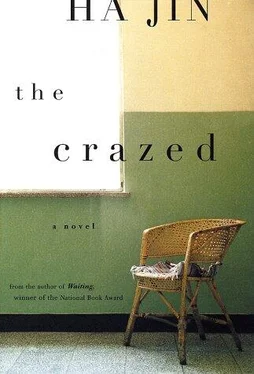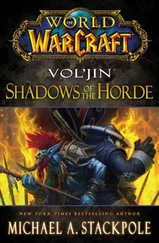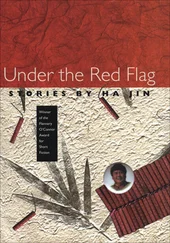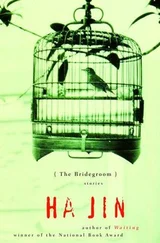When I arrived at the hospital, Mrs. Yang, Banping, Mali Chen, and several others were in the sickroom. Dr. Wu was there too, wearing a grimy stethoscope around his neck, a cigarette in a jade holder clamped between his teeth. At the sight of me the nurses stepped aside to let me get to the bedside. My teacher looked lifeless, his face ghastly and a large bandage on his right temple. From the evasive look in the doctor’s eyes I could tell that no medication would help Mr. Yang anymore, though an IV bottle still hung on an iron stand beside the bed, whitish liquid dripping listlessly into the brown rubber tube.
Mr. Yang’s lips moved, but his voice was inaudible. Slowly he opened his eyes, which gradually expanded into an earnest look. “Nanyan,” he murmured.
“I’m here, Shenmin.” Mrs. Yang held his hand in both of hers.
“I’m sorry, truly sorry,” he said.
“Don’t talk like this, please!” she begged tearfully.
“Forgive me, dear.”
“You mustn’t think of leaving me, Shenmin!”
“Too late,” he mumbled and closed his eyes.
A heavy hush descended in the room, and everyone watched him intently. A moment later, he opened his eyes again. His face showed an intense effort, as though he was struggling to suppress some pain. His eyes searched around slowly but with eagerness. “Tell me what you want, Shenmin,” his wife asked, sobbing.
His lips stirred again; he was saying something none of us could make out. He turned his head a little, his gaze fixed on the window half draped with green chintz curtains. On the sill sat Brecht’s Good Woman of Szechwan, which hadn’t vanished perhaps because few people here could understand the play. I went over, picked up the book, and waved it at Mr. Yang. Sluggishly he shook his head. I put it down and drew the curtains together to block out the daylight; the room at once became darker, but he shook his head again. I pushed the curtains aside to let in the light. He nodded, so I opened the window too. He observed the outside world with a distant look in his glazed eyes, his face almost vacant. Beyond the mountain of anthracite the sky was pale with smog, an elongated, underlit cloud gliding over the aspen crowns whose leaves were flickering in the breeze. Somewhere pigeons were cooing. Blankly Mr. Yang stared at the outside; he seemed disappointed, maybe already unable to see anything clearly. He went on shaking his chin as though irritated by something. A gust of wind tossed up a small cloud of coal dust; then a ray of sunlight fell on one of the concrete smokestacks and bounced slantwise toward the window. For a moment the room was brighter, but Mr. Yang didn’t seem to notice any change. He withdrew his eyes from the window and closed them, facing the ceiling and murmuring something again.
Both Mrs. Yang and I stepped closer and bent down to listen, but again couldn’t understand his words. So I straightened up and joined the others, standing stupefied and watching him while his wife wept, her hand on his upper arm.
“It was awful yesterday afternoon,” Banping whispered to me. “He recited poetry without a stop.”
“What poetry?” I asked.
“Mainly Dante, I guess.”
“What part of Dante? Inferno or Paradiso ?”
“I don’t know, I’ve never read Dante.”
Mr. Yang heard my voice and moaned faintly, “Jian, Jian—”
All eyes turned to me as I stepped closer and leaned over him. “Mr. Yang, I’m here. This is Jian.” I held his cold hand in my fingers.
“Save me, save my soul!” he gasped.
“I’m with you, Mr. Yang.”
“I’m scared.”
“We’re all here, nobody can hurt you.”
“Oh, don’t touch me!”
I let go of his hand. “What do you want me to do, Mr. Yang?”
“Keep them away from us!”
“Who?”
“Save her.”
“Who are you talking about?”
He didn’t answer. I was on the point of asking “You mean Weiya?” but checked my tongue.
His lips still quivered, his voice tapering off. He seemed to be uttering something desperately while I strove to listen, but I couldn’t hear a thing. I observed him for a minute or two. Then he made some audible sounds again, and I put my right ear to his mouth. Now his voice was clearer. He said while exhaling feebly, “Jian, Jian—”
“Yes, I’m here.”
“Be good to Meimei.”
“I will.”
“Remember, avenge me and. . don’t forgive any one of them. K-kill them all!” His eyes suddenly opened, glinted fiercely, then closed, for good.
I was stunned by his last words, of which I could make nothing. I hunched over the bed with a blank mind, my eyes fastened on him. His mouth was half open as though he were still struggling to inhale, and his face gradually stiffened. Behind his parched lips, his teeth were yellow and dark along the gums. Two of his molars had gold fillings.
I was still in a daze as Mrs. Yang broke into short, rapid sobs. Mali Chen held my arm and pulled me away so that the other nurses could disconnect the apparatus from him. Not until now did I begin weeping. Tears ran down my face while something was writhing in my chest; I was sobbing shamelessly like a wretched small boy. Except for Banping, who looked sideways at me now and again, nobody seemed surprised by my crying. None understood why I had suddenly given way to my emotions. Even I myself couldn’t explain my feelings until some time later. A middle-aged woman said to Nurse Jiang about me, “He must love his teacher dearly like a father.” Two other nurses tried consoling Mrs. Yang in the opposite corner of the room.
Mali Chen handed me a clean towel. “Don’t be so heartbroken, Jian,” she said with wet eyes. “He often called to you at night. He must’ve been relieved to see you before he passed away.”
“Thanks,” I mumbled.
Then Banping held my elbow and led me out of the room. My head was swimming, unable to understand the full meaning of Nurse Chen’s words. The stains of drying tears were still stinging my lower lids.
In the hallway Banping sighed and patted me on the shoulder. “Don’t be too sad, Jian. Maybe it was time for him to go. He suffered enough.”
His words brought me back to my senses to a degree. As we walked along the corridor, I said to him, “It was an awful, awful death!”
“Come, it’s normal,” he said impassively. “All the dead have the same ending. Death is the ultimate equalizer.”
“How can you say that?” I couldn’t help staring at him.
“All I mean is that he died naturally. A lot of people are bedridden for years before making their final exits. By comparison, our teacher didn’t suffer that much. We should be grateful for that.”
“Do you know what his last words were?”
“What were they?”
“He told me to kill all his enemies!”
With the same unperturbed face he replied, “Considering he wasn’t himself anymore and what he’d gone through, that isn’t too outrageous. We all have our enemies and shouldn’t judge the dead too harshly. We should forgive him for saying that.”
I realized it was impossible to make him see the monstrosity of our teacher’s death, because he thought of suffering only in the physical sense. What a callous mind he had! As an educated man, why did he seem to have no spiritual dimension in his mind at all? He had heard Mr. Yang sing songs and recite poems and had witnessed his struggle to save his soul, but nothing could touch him deeply or enable him to commiserate with our teacher beyond the level of bodily pain. He only understood the suffering of the flesh. No wonder he was so at home in this world, where callousness is a source of strength, essential for survival, and where most people are obsessed only with the health and longevity of the body. I took the Rose cigarette he lit for me, dragging on it relentlessly.
Читать дальше

![Lao Zi - Dao De Jing [Tao Te Ching] (english)](/books/3890/lao-zi-dao-de-jing-tao-te-ching-english-thumb.webp)
![Lao Zi - Dao De Jing [Tao Te Ching] (chinese)](/books/3891/lao-zi-dao-de-jing-tao-te-ching-chinese-thumb.webp)
![Lao Zi - Dao De Jing [Tao Te Ching] (espanol)](/books/3892/lao-zi-dao-de-jing-tao-te-ching-espanol-thumb.webp)







